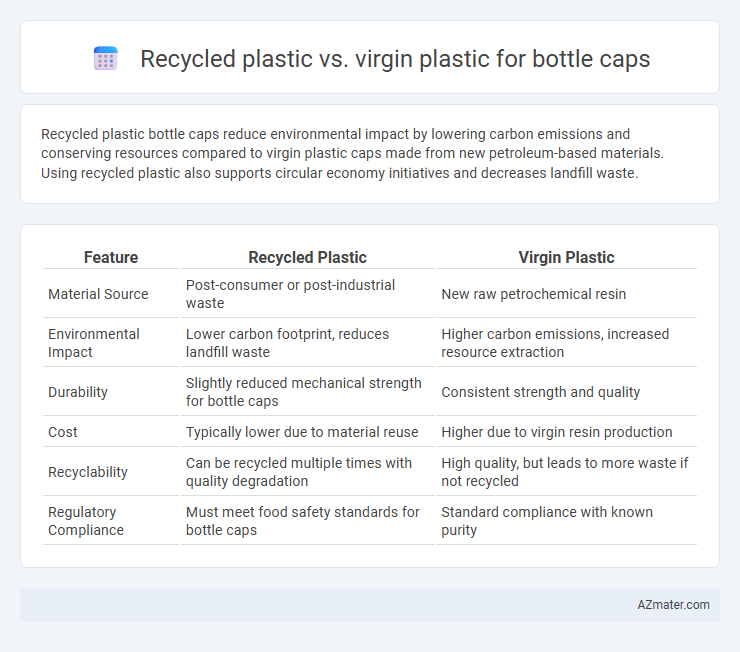Recycled plastic bottle caps reduce environmental impact by lowering carbon emissions and conserving resources compared to virgin plastic caps made from new petroleum-based materials. Using recycled plastic also supports circular economy initiatives and decreases landfill waste.
Table of Comparison
| Feature | Recycled Plastic | Virgin Plastic |
|---|---|---|
| Material Source | Post-consumer or post-industrial waste | New raw petrochemical resin |
| Environmental Impact | Lower carbon footprint, reduces landfill waste | Higher carbon emissions, increased resource extraction |
| Durability | Slightly reduced mechanical strength for bottle caps | Consistent strength and quality |
| Cost | Typically lower due to material reuse | Higher due to virgin resin production |
| Recyclability | Can be recycled multiple times with quality degradation | High quality, but leads to more waste if not recycled |
| Regulatory Compliance | Must meet food safety standards for bottle caps | Standard compliance with known purity |
Introduction to Bottle Cap Materials
Bottle caps are commonly manufactured using either recycled plastic or virgin plastic, each offering distinct material properties and environmental impacts. Virgin plastic, derived directly from petrochemical sources, ensures consistent purity, durability, and strength essential for secure sealing. Recycled plastic, made from reprocessed post-consumer waste, provides sustainability benefits by reducing landfill waste and carbon footprint while meeting industry standards for safety and functionality in bottle cap production.
What is Recycled Plastic?
Recycled plastic for bottle caps is made from post-consumer or post-industrial plastic waste that has been processed and reformed into new plastic pellets suitable for manufacturing. This material reduces reliance on virgin plastic, which is derived from non-renewable petroleum resources and requires more energy-intensive production. Using recycled plastic helps decrease environmental impact by minimizing plastic waste in landfills and lowering carbon emissions associated with raw material extraction.
What is Virgin Plastic?
Virgin plastic refers to polymer resin produced directly from petrochemical feedstocks without any previous use or processing, ensuring pure, uncontaminated material with consistent properties ideal for bottle caps. This type of plastic provides superior strength, durability, and resistance to contamination compared to recycled plastic, making it preferred for applications requiring high-quality seals and safety standards. Virgin plastic's uniformity improves manufacturing efficiency and performance, but it has a higher environmental impact due to resource extraction and energy consumption.
Production Process: Recycled vs Virgin Plastic
The production process for bottle caps using recycled plastic involves collecting, sorting, cleaning, and melting post-consumer plastic waste, which reduces energy consumption and greenhouse gas emissions compared to virgin plastic manufacturing. Virgin plastic production requires extraction and polymerization of raw petrochemical materials, resulting in higher environmental impact and resource use. Recycling plastic for bottle caps also demands careful contamination control to maintain material integrity and performance standards.
Environmental Impact Comparison
Recycled plastic reduces landfill waste and lowers carbon emissions by using existing materials, while virgin plastic production relies on fossil fuels and emits higher greenhouse gases. The energy consumption for producing recycled plastic bottle caps is up to 70% less compared to virgin plastic, significantly decreasing environmental footprint. Additionally, recycled plastics help conserve natural resources and reduce ocean pollution, promoting a circular economy in plastic manufacturing.
Cost Analysis: Recycled vs Virgin Plastic
Recycled plastic for bottle caps typically reduces material costs by 20-40% compared to virgin plastic due to lower energy consumption and raw material expenses. Virgin plastic, derived from petroleum, incurs higher processing costs and price volatility linked to crude oil markets. However, recycled plastic may require additional sorting and cleaning expenses, potentially offsetting some savings depending on scale and quality requirements.
Performance and Safety Differences
Recycled plastic bottle caps often exhibit slightly lower tensile strength and reduced impact resistance compared to virgin plastic, which can affect durability under extreme conditions. Virgin plastic offers consistent chemical purity, minimizing contamination risk and ensuring safer food and beverage sealing standards. While recycled plastic contributes to sustainability goals, careful quality control is essential to match virgin plastic's performance and regulatory safety requirements.
Regulatory Standards and Compliance
Recycled plastic bottle caps must meet stringent regulatory standards such as FDA and EU food contact regulations to ensure safety and hygiene equivalent to virgin plastic. Compliance involves rigorous testing for contaminants, migration limits, and mechanical properties to guarantee performance consistency and consumer protection. Meeting these standards supports sustainable packaging initiatives without compromising regulatory requirements or product quality.
Consumer Perception and Market Trends
Consumer perception of recycled plastic bottle caps is increasingly positive due to growing environmental awareness and demand for sustainable packaging solutions. Market trends indicate a substantial rise in the adoption of recycled plastic, driven by regulatory pressures and corporate commitments to reduce carbon footprints. Despite slight concerns about durability and appearance, innovations in recycled plastic technology are closing the quality gap compared to virgin plastic caps.
Future Outlook for Sustainable Bottle Cap Solutions
The future outlook for sustainable bottle cap solutions strongly favors recycled plastic due to increasing regulatory pressures and growing consumer demand for eco-friendly packaging. Innovations in recycled polymer technology enhance the durability and safety of bottle caps, making them viable alternatives to virgin plastics while reducing environmental impact. Industry projections indicate a significant rise in recycled content mandates, driving widespread adoption and investment in circular economy practices for bottle cap production.

Infographic: Recycled plastic vs Virgin plastic for Bottle cap
 azmater.com
azmater.com